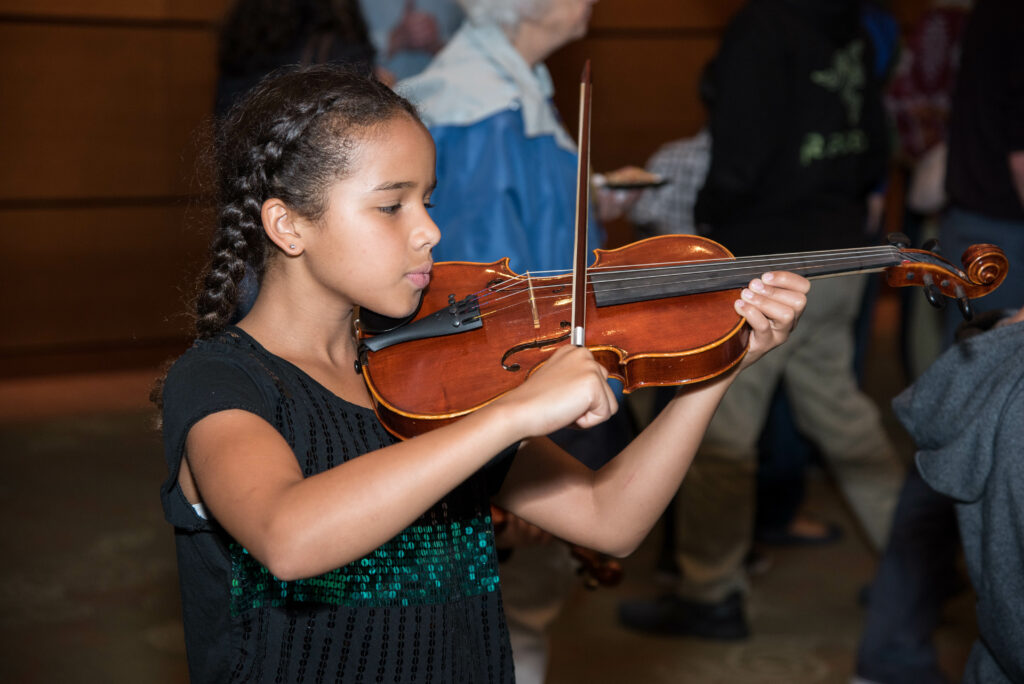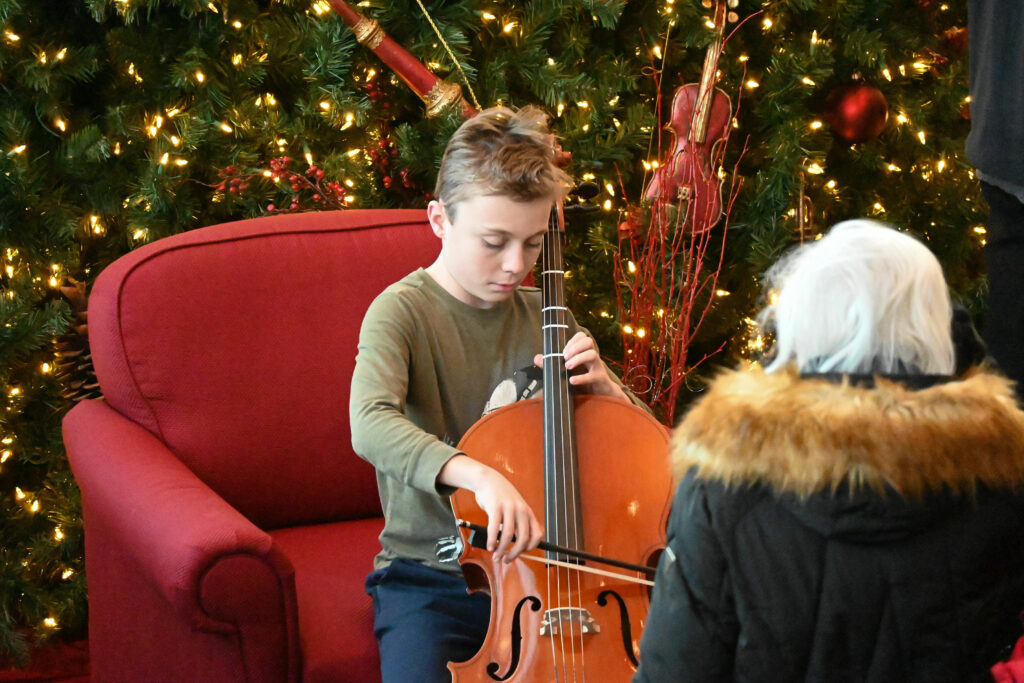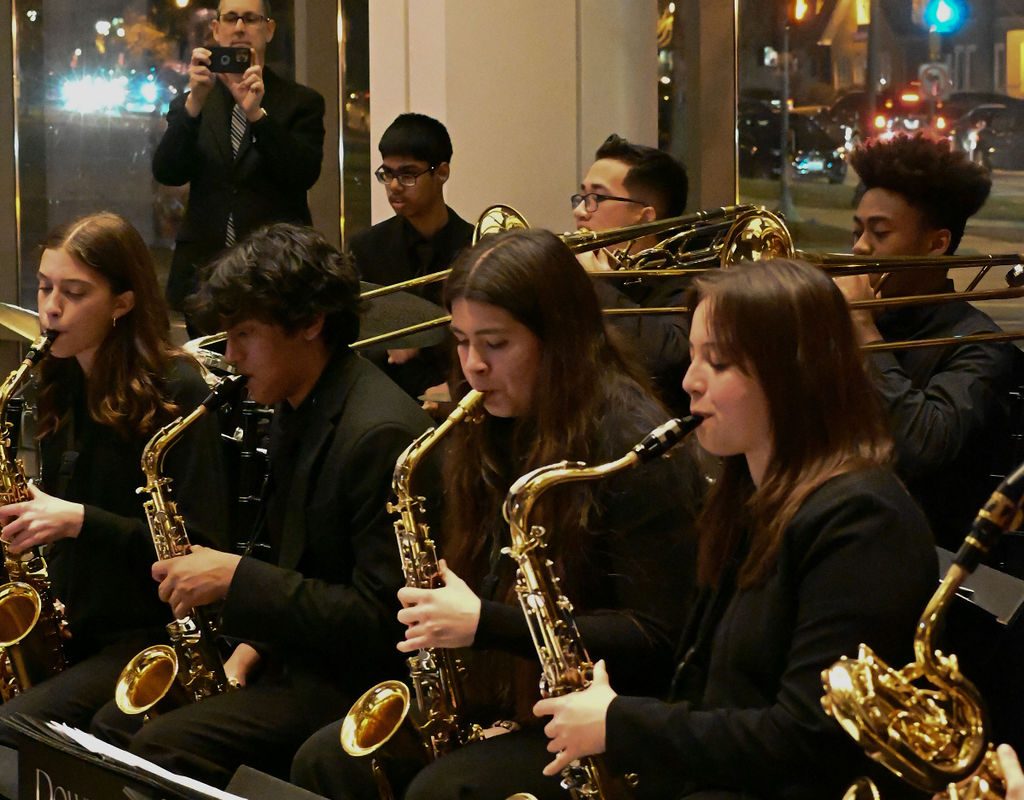Music Advocacy
The DuPage Symphony Embraces Music Education
The DSO believes that the Arts should be considered an essential part of every child’s comprehensive K-12 education. Scientific research has shown that, in addition to providing social and mental health benefits, music education enhances cognitive development and helps students build a competitive advantage for success in school, work, and life. The DSO strongly believes in the benefits of a music education and advocates for high quality music programs through its partnerships with area schools and local music stores, as well as through its involvement in a wide variety of community events.
With our youth educational and community engagement programs, the DSO strives to enrich our community and bring the real-life experience of symphonic music to new audiences. You can learn more about our youth resources here.
Click on the buttons below to access music advocacy resources.
Learn about what other music organizations are doing for music advocacy and how to get involved at the below links.
Dr. Charles “Chip” Staley, Honorary Doctorate of Music, presented on music advocacy in the video to the right. Watch the video to learn more.



Why Study Music?
- The ability to assimilate disparate pieces of information in the process of creating new ideas, interpretations, products, & solutions to problems.
- The capacity to synthesize rather than analyze.
- The imaginative skill to see relationships between seemingly unrelated fields, to detect broad patterns rather than specific answers, to create something by combining elements nobody else thought to combine; to be a boundary crosser.
- The ability to see (hear) the big picture.
- The ability to place facts, or in the case of musicians sounds, in a creatively memorable context & deliver them with emotional impact.
- The capacity of sharpening understanding of one thing by expressing it in the context of something else.
- A pathway to understanding that does not run through the left side of the brain.
- The capacity to recognize & appreciate the combination of function & beauty.
- The ability to think and create “artistically.”
- Aesthetics matter. Attractive things work better. Good design is a renaissance attitude that combines technology, cognitive science, human need, & beauty to produce something that the world did not know was missing.
Music Advocacy Research Corner
The DSO has compiled a list of research articles and resources on the effects of music on individuals’ mental health and wellbeing. The resources are grouped by topic. This is not intended to be an exhaustive list, but rather a starting place in your music research journey.
Each resource consists of a brief abstract, citation, and link to the external site to read the article. While a number of these resources are open to the general public, some require an account in order to access the content.
*Please note: inclusion in the DSO’s Music Advocacy Research Corner does not imply endorsement of, or agreement with, the contents by the DuPage Symphony Orchestra and are intended for research purposes only.
“Impact of Music on Academic Performance”
This study investigates the relationship between classical music engagement and academic performance among students. It examines how exposure to classical music influences cognitive abilities, attention, and academic achievement.
Ms. Poorvi Dasadia , Dr. Ashwin Kumar A. Patel. (2022). Impact of Music on Academic Performance: An Empirical Study of Post Graduate Students of Selected University of Vadodara, International Journal of Innovative Research in Engineering and Management (IJIREM), 9(3). 119-122, doi:10.55524/ijirem.2022.9.3.18.
Out of Our Minds – The Power of Being Creative written by Sir Ken Robinson, Ph.D.
“Out of Our Minds explores creativity: its value in business, its ubiquity in children, its perceived absence in many adults and the phenomenon through which it disappears — and offers a groundbreaking approach for getting it back. In this book, Sir Ken argues that organizations everywhere are struggling to fix a problem that originates in schools and universities. Organizations everywhere are competing in a world that changes in the blink of an eye – they need people who are flexible enough to adapt, and creative enough to find novel solutions to problems old and new. Out of Our Minds describes how schools, businesses and communities can work together to bring creativity out of the closet and realize its inherent value at every stage of life.”
The Element – How Finding Your Passion Changes Everything by Sir Ken Robinson, Ph.D.
“The Element is the point at which natural talent meets personal passion. When people arrive at the Element, they feel most themselves and most inspired and achieve at their highest levels. With a wry sense of humor, Ken Robinson looks at the conditions that enable us to find ourselves in the Element and those that stifle that possibility. Drawing on the stories of a wide range of people, including Paul McCartney, Matt Groening, Richard Branson, Arianna Huffington, and Bart Conner, he shows that age and occupation are no barrier and that this is the essential strategy for transforming education, business, and communities in the twenty-first century.”
Catching Up or Leading the Way by Yong Zhao
“At a time when globalization and technology are dramatically altering the world we live in, is education reform in the United States headed down the right path? Are schools emphasizing the knowledge and skills that students need in a global society–or are they actually undermining their strengths by overemphasizing high-stakes testing and standardization? Are education systems in China and other countries really as superior as some people claim?
These and other questions are at the heart of author Yong Zhao’s thoughtful and informative book. Born and raised in China and now a distinguished professor at Michigan State University, Zhao bases many of his observations on firsthand experience as a student in China and as a parent of children attending school in the United States. His unique perspective leads him to conclude that American education is at a crossroads, and we need to change course to maintain leadership in a rapidly changing world.”
Strong Arts, Strong Schools – The Promising Potential and Shortsighted Disregard of the Arts in American Schooling by Charles Fowler
“Because of cuts in school budgets, coupled with anxiety about an apparent decline is basic academic skills, many parents, educators, and policy makers have come to view arts education–the teaching of music, painting, dancing, or creative writing–as a luxury, an unnecessary drain on time and money better applied to the three Rs. But in Strong Arts, Strong Schools, one of America’s leading champions of arts in the schools, the late Charles Fowler, provides compelling evidence that the arts are a vital component of any child’s education. Indeed, he shows that schools with strong arts programs are also stronger academically–that the arts enhance an academic education.”
A Whole New Mind – Why Right-Brainers Will Rule the Future by Daniel Pink
“The future belongs to a different kind of person with a different kind of mind: artists, inventors, storytellers-creative and holistic “right-brain” thinkers whose abilities mark the fault line between who gets ahead and who doesn’t.
Drawing on research from around the world, Pink (author of To Sell Is Human: The Surprising Truth About Motivating Others) outlines the six fundamentally human abilities that are absolute essentials for professional success and personal fulfillment–and reveals how to master them. A Whole New Mind takes readers to a daring new place, and a provocative and necessary new way of thinking about a future that’s already here.”
The Musician’s Mind – Teaching, Learning and Performance in the Age of Brain Science by Lynn Helding
“Where does learning begin and how is it sustained and stored in the brain? For musicians, these questions are at the very core of their creative lives. Cognitive and neuroscience have flung wide the doors of our understanding, but bridging the gap between research data and music-making requires a unique immersion in both worlds. Lynn Helding presents a symphony of discoveries that illuminate how musicians can optimize their mental wellbeing and cognitive abilities. She addresses common brain myths, motor learning research and the concept of deliberate practice, the values of instructional feedback, technology’s role in attention disorders, the challenges of parenting young musicians, performance anxiety and its solutions, and the emerging importance of music as a social justice issue. More than an exploration of the brain, The Musician’s Mind is an inspiring call for artists to promote the cultivation of emotion and empathy as cornerstones of a civilized society. No matter your instrument or level of musical ability, this book will reveal to you a new dynamic appreciation for the mind’s creative power.”
The Power of Sound: How to Be Healthy and Productive Using Music and Sound by Joshua Leeds
“Joshua Leeds–a pioneer in the application of music for health, learning, and productivity–explains how sound can be a powerful ally. He explores chronic sensory overload and how auditory dysfunction often results in difficulties with learning and social interactions. He offers innovative techniques designed to invigorate auditory skills and provide balanced sonic environments.
In this revised and updated edition of The Power of Sound, Leeds includes current research, extensive resources, analysis of the maturing field of soundwork and a look at the effect of sound on animals. He also provides a 75-minute CD of psychoacoustically designed classical music for a direct experience of the effect of simplified sound on the nervous system. With new information on how to use music and sound for enhanced health and productivity, The Power of Sound provides readers with practical solutions for vital and sustained well-being.”
The Science of Music and the Music of Science – How Music Reveals Our Brain, Our Humanity, and the Cosmos by Michael J. Montague
“This book describes these scientific advances accessibly and without jargon, but entertainingly and accurately. It provides the reader with an easy and graceful insight into basic music theory, the biology of the brain, the use of music as brain therapy, the psychology of music, the tools of the composer, the importance of music education for our children, and finally the story of our search for the fundamental nature of reality itself–leading ultimately to a better understanding of our humanity. It is written for anyone interested in music, science, the well-being of our children, and the best aspects of our humanity as we live in this magnificent Cosmos.”
On Repeat – How Music Plays the Mind by Elizabeth Hellmuth Margulis
“On Repeat offers the first in-depth inquiry into music’s repetitive nature, focusing not on a particular style, or body of work, but on repertoire from across time periods and cultures. Author Elizabeth Hellmuth Margulis draws on a diverse array of fields including music theory, psycholinguistics, neuroscience, and cognitive psychology, to look head-on at the underlying perceptual mechanisms associated with repetition. Her work sheds light on a range of issues from repetition’s use as a compositional tool to its role in characterizing our behavior as listeners, and then moves beyond music to consider related implications for repetition in language, learning, and communication.”
Voice Leading – The Science Behind a Musical Art by David Huron
“Musical passages exhibit a wide range of textures. These can include monophony, tune-and-accompaniment, homophony, close harmony, polyphony, pseudo-polyphony, heterophony, and a wealth of specially tailored arrangements with various hierarchical structures. Introductory music theory textbooks generally focus on Baroque voice-leading rules to the virtual exclusion of other types of part-writing. Although most music-making bears little resemblance to Baroque-style four-part chorale writing, there are excellent reasons why this particular practice has formed the core theory curriculum for so long. The evidence suggests that late Baroque practice most closely reflects known principles of auditory scene analysis. The perceptual principles underlying voice leading provide an important entry point for understanding any musical texture—no matter what the style, culture, or genre of music-making. Like a theatrical stage, composers set a “musical scene.” Auditory scene analysis is the process by which listeners subjectively apprehend that scene.”
Of Sound Mind: How Our Brain Constructs a Meaningful Sonic World by Dr. Nina Kraus, Northwestern University.
Of Sound Mind examines the partnership of sound and brain, showing that the processing of sound drives many of the brain’s core functions and leaves a fundamental imprint on who we are as human beings. Kraus, a neuroscientist, explores the power of music for hearing every sound as well as the destructive power of noise on cognitive and mental health. The sounds of our lives shape our brains, for better and for worse, and help us build the sonic world in which we live.
“The Effects of Music Instruction on Cognitive Development in Children”
This research study by the Journal of Applied School Psychology explores the positive impact of music education, including classical music, on children’s cognitive development. It examines how music education enhances skills such as language processing, memory, attention, and problem-solving.
Bugaj, K., & Brenner, B. (2011). The Effects of Music Instruction on Cognitive Development and Reading Skills-An Overview. Bulletin of the Council for Research in Music Education, 189, 89–104. https://doi.org/10.5406/bulcouresmusedu.189.0089
“The Role of Classical Music in Social and Emotional Development”
This article explores how classical music contributes to the social and emotional development of children and adolescents. It discusses how exposure to classical music can enhance empathy, emotional expression, and social interaction skills.
Váradi, J. (2022). A Review of the Literature on the Relationship of Music Education to the Development of Socio-Emotional Learning. SAGE Open, 12(1). https://doi.org/10.1177/21582440211068501
“The Impact of a Community-based Music Intervention on the Health and Well-being of Young People: A Realist Evaluation”
This article is a concise review of the research to date and future directions on the utilization of music to improve health outcomes in youth. A role for music in public health is emphasized.
Caló, F., Steiner, A., Millar, S., & Teasdale, S. (2020). The impact of a community‐based music intervention on the health and well‐being of young people: A realist evaluation. Health & Social Care in the Community, 28(3), 988-997, https://doi.org/10.1111/hsc.12931
“Does Active Engagement in Community Music Support the Well-Being of Older People?”
This article provides a convincing rationale for how participating in music may have important cognitive and social benefits of older people. Responses to surveys a group of older adults who participated in musical activities were compared to a group who did not. Results suggest that participation in music can have a substantial impact on psychological well-being in the elderly.
Hallam, S., Creech, A., Varvarigou, M., McQueen, H., & Gaunt, H. (2014). Does active engagement in community music support the well-being of older people? Arts & Health, 6(2), 101-116, DOI: 10.1080/17533015.2013.809369
“Effects of Classical Music Virtual Reality on Pediatric Healthcare Worker Compassion Fatigue”
This interesting research exposed healthcare workers to a series of virtual reality sessions in which classical music was presented. The study posits that that engagement in music may reduce stress-levels and burnout, which reached significantly high levels among healthcare workers during the pandemic. Results suggested that engagement in music may reduce symptoms of burnout and fatigue and serve as a viable option for improving well-being among front-line healthcare workers, particularly those working in high-stress conditions such as during the Covid-19 pandemic.
Hayakawa, J., Barrows, J., See, S., & Schomberg, J. (2022). Effects of classical music virtual reality on pediatric healthcare worker compassion fatigue. JONA: The Journal of Nursing Administration, 52(5):p 280-285, May 2022, DOI: 10.1097/NNA.0000000000001148
“Music, Health, and Well-being: A review”
This article surveys the individual psychological benefits and community public health benefits of several music interventions, including music education, music therapy, medical interventions that may incorporate music, and community music programs. Evidence from qualitative studies suggests that the opportunity to engage in create activities in a supportive environment can have positive therapeutic and social-psychological outcomes.
MacDonald R. A. (2013). Music, Health, and Well-being: A Review. International Journal of Qualitative Studies on Health and Well-being, 8, 20635. https://doi.org/10.3402/qhw.v8i0.20635
“The Effect of Classical Music on Anxiety and Well-Being of University Students”
This study focused upon the role that listening to classical music may play in the reduction of anxiety, a common experience in the day-to-day lives of university and college students. Results on several anxiety-related standardized questionnaires suggested improvement in anxiety-related symptoms for students who listened to music relative to those who did not, but results were not consistent across all measures. More research on a potential role of music in reducing college student anxiety is in order.
Osmanoglu, D. E., & Yilmaz, H. (2019). The Effect of Classical Music on Anxiety and Well-Being of University Students. International Education Studies, 12(11), 18-25, https://eric.ed.gov/?id=EJ1232294
“Wellbeing and Integration Through Community Music: The Role of Improvisation in a Music Group of Refugees, Asylum Seekers and Local Community Members”
This study explored the effects of participation in Welsh choral activities on refugees and asylum seekers in Wales, suggesting that participation in community musical activities may play an important role in the rehabilitation and community reintegration of refugees.
Vougioukalou, S., Dow, R., Bradshaw, L., & Pallant, T. (2019). Wellbeing and integration through community music: The role of improvisation in a music group of refugees, asylum seekers and local community members. Contemporary Music Review, 38(5), 533-548, DOI: 10.1080/07494467.2019.1684075
Every Brain Needs Music: The Neuroscience of Making & Listening to Music by Dr. Larry Sherman, Oregon Health & Science University
Every Brain Needs Music draws on leading behavioral, cellular, and molecular neuroscience research as well as surveys of more than a hundred musical people. It provides new perspectives on learning to play, teaching, how to practice and perform, the ways we react to music, and why the brain benefits from musical experiences.
Written for both musical and non-musically trained people, including newcomers to brain science, this book is a lively and easy-to-read exploration of the neuroscience of music and its significance in our lives.
Podcast discussing book: https://mpetersonmusic.com/podcast/episode166
Book: https://cup.columbia.edu/book/every-brain-needs-music/9780231209106
Brainvolts Lab
Brainvolts Lab from Northwestern University provides several different resources and articles relating to music and how it impacts our mental health and wellbeing, as well as how it is beneficial to have music education in schools.

